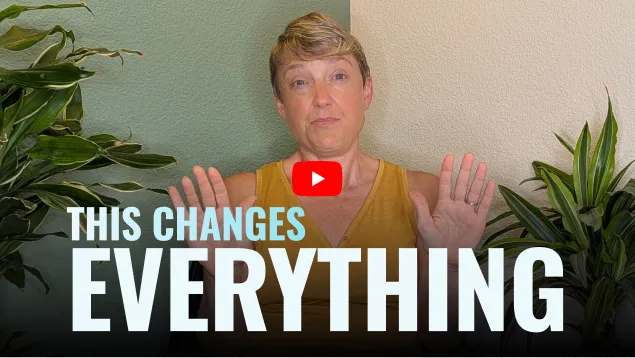Why You Feel Overwhelmed, And How to Calm Your Nervous System

Have you ever felt completely flooded by emotion, so much so that you couldn’t calm down no matter how hard you tried?
Maybe your body felt like it was in overdrive. Your heart was racing, your thoughts were spiraling, and it felt like something deep inside you had taken over. It’s like your system got hijacked, and you didn’t know how to bring yourself back.
That experience is called emotional overwhelm. And it’s not random. It’s a sign that something deeper is going on in your nervous system.
What’s Actually Happening When You Feel Overwhelmed
When you’re overwhelmed, it usually means an old neural pathway has been triggered. This pathway was created during a time when your brain was still developing. Most often, that happened in childhood. It links strong emotional sensations with the unconscious belief that you are not safe.
Here’s how it works. When we’re born, our brains are not fully online. Our amygdala, which senses danger, is active at birth. But our frontal lobe, which helps us regulate emotion and make sense of our experience, takes much longer to develop.
We depend on the adults in our lives to help us feel safe and build healthy emotional pathways. But if we didn’t consistently get the comfort we needed, our brains learned to associate stress or sadness with danger. That becomes the blueprint.
Later in life, something small can trigger that old wiring. A late text. A stressful email. A silence that feels just a little too long. Your system goes into overdrive, and you don’t know why.
This Doesn’t Mean You’re Broken
It just means you weren’t taught how to regulate your emotions. Most of us weren’t. And it doesn’t mean your parents failed you. It probably means they weren’t taught either.
But here’s the good news. The brain can change. You can create new pathways. You can learn to regulate your nervous system now, as an adult.
A Client Story
I once worked with a client who had severe anxiety. They felt like they always had to be working. They couldn’t take breaks. Their thoughts were racing, their heart was pounding, and they were caught in a loop of fear and hypervigilance.
In session, I validated what they were feeling. I didn’t try to fix it or push it away. Instead, I helped them gently accept their experience and guided them in a breathing practice.
In the session, their body calmed down. Their nervous system regulated. But when they tried the same practice at home, it didn’t work. In fact, they felt more anxious.
So I asked them what was different.
They said: “You don’t treat my anxiety like it’s bad. You just accept it. But when I’m alone, I just want it to go away.”
That was the key.
The Practice: Don’t Try to Make It Go Away
If you’re doing a breathing practice just to get rid of anxiety, your system will feel that resistance. It will take longer to calm down.
Instead, try this.
- Accept your emotional state.
- Welcome the part of you that feels overwhelmed.
- Say: “You’re allowed to be here. Let’s do this together.”
Then begin this breathing practice:
- Inhale for a count of 4: one, two, three, four
- Exhale for a count of 4: one, two, three, four
- Continue for a few minutes
- Let your breath deepen into your abdomen
- Allow your rib cage to expand
As you breathe:
- Notice your breath
- Don’t force anything
- Just observe
- Be kind to yourself
This gentle rhythm activates your parasympathetic nervous system, your body’s rest and digest mode. When your breath becomes slow and deep, your body starts to feel safe again.
This Is Your Natural State
A regulated nervous system is how you know you’re connected to your inner compass. Your inner compass is the clearest part of who you are.
When you’re living from that place, your body feels calm, open, curious, and grounded. When you're not, it just means there’s a part of you asking for care.
Keep Practicing
You don’t have to get it perfect. This is a process of re-learning. You're creating new neural pathways, ones that lead you back to calm, connection, and clarity.
This is the work I write about in my upcoming book, The Divine Within: Healing Ourselves to Heal the World, which will be out in December. In the book, I offer many practices like this one to help you come home to yourself.
Until then, keep breathing. Keep returning. You’re not alone in this.
About The Author
Allison Batty-Capps is a consciousness catalyst, spiritual teacher, and transmitter of Divine Human embodiment. She is a licensed mental health therapist, Reiki Master, Yoga Coach and spiritual channeler. She works at the intersection of psychology, mysticism, shadow alchemy, and God-consciousness, offering teachings that unify the human and the divine.
Her work is not about healing people — it is about awakening them.
Her presence carries a frequency that reminds others of their inherent sovereignty, their inner wisdom, and their direct connection to the Divine.
Through her books, teachings, sessions, and transmissions, Allison guides people into the maturity of spiritual adulthood — where compassion meets boundaries, love meets truth, and the soul meets the body.
She is devoted to helping humanity evolve beyond fear, beyond hierarchy, and beyond old paradigms of spirituality into a new era of embodied consciousness.
Allison lives what she teaches.
Her life reveals what unfolds when a person remembers they are not alone or separate, but a wave formed from the infinite ocean of God’s consciousness.

Join the Community!
Receive wellness tips, resources, book updates, and more directly in your inbox!
Related Posts
.jpg)
The Power of Self-Compassion

When Willpower Becomes Violence
.png)